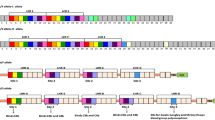Abstract
There is evidence to suggest a role for immune dysfunction in the pathogenesis of Alzheimer’s disease, and it has previously been shown that blood plasma levels of the protein complement factor H, a member of the alternative complement pathway, was specifically elevated in people with late-onset Alzheimer’s disease. We have genotyped the common complement factor H Y402H polymorphism in a large case–control cohort to investigate association with late-onset Alzheimer’s disease susceptibility and find no evidence that this SNP is associated with disease risk. However, it remains possible that another variant in this gene may modify susceptibility for late-onset Alzheimer’s disease.
Similar content being viewed by others
References
Baird, P. N., Islam, F. M., Richardson, A. J., Cain, M., Hunt, N., & Guymer, R. (2006). Analysis of the Y402H variant of the complement factor H gene in age-related macular degeneration. Investigative Ophthalmology & Visual Science, 47, 4194–4198.
Bradt, B. M., Kolb, W. P., & Cooper, N. R. (1998). Complement-dependent proinflammatory properties of the Alzheimer’s disease beta-peptide. The Journal of Experimental Medicine, 188, 431–438.
Hamilton, G., Samedi, F., Knight, J., Archer, N., Foy, C. et al. (2006). Polymorphisms in the phosphate and tensin homolog gene are not associated with late-onset Alzheimer’s disease. Neuroscience Letters, 401, 77–80.
Hixson, J. E., & Vernier, D. T. (1990). Restriction isotyping of human apolipoprotein-e by gene amplification and cleavage with Hhai. Journal of Lipid Research, 31, 545–548.
Hughes, A. E., Orr, N., Esfandiary, H., Diaz-Torres, M., Goodship, T., & Chakravarthy, U. (2006). A common CFH haplotype, with deletion of CFHR1 and CFHR3, is associated with lower risk of age-related macular degeneration. Nature Genetics, 38, 1173–1177.
Hye, A., Lynham, S., Thambisetty, M., Causevic, M., Campbell, J. et al. (2006). Proteome-based plasma biomarkers for Alzheimer’s disease. Brain, 129, 3042–3050.
Klaver, C. C., Ott, A., Hofman, A., Assink, J. J., Breteler, M. M., & de Jong, P. T. (1999). Is age-related maculopathy associated with Alzheimer’s disease? The Rotterdam study. American Journal of Epidemiology, 150, 963–968.
Lee, A. J., McInerney, P. J., & Mullins, P. R. (1984). STATCALC—and integrated statistics system for the Apple-II microcomputer. Computer Programs in Biomedicine, 18, 265–272.
Li, M., Atmaca-Sonmez, P., Othman, M., Branham K. E., Khanna, R. et al. (2006). CFH haplotypes without the Y402H coding variant show strong association with susceptibility to age-related macular degeneration. Nature Genetics, 38, 1049–1054.
Malek, G., Johnson, L. V., Mace, B. E., Saloupis, P., Schmechel, D. E. et al. (2005). Apolipoprotein E allele-dependent pathogenesis: a model for age-related retinal degeneration. Proceedings of the National Academy of Sciences of the United States of America, 102, 11900–11905.
Maller, J., George, S., Purcell, S., Fagerness, J., Altshuler, D. et al. (2006). Common variation in three genes, including a noncoding variant in CFH, strongly influences risk of age-related macular degeneration. Nature Genetics, 38, 1055–1059.
McGeer, E. G., Klegeris, A., & McGeer, P. L. (2005). Inflammation, the complement system and the diseases of aging. Neurobiol Aging, 26 (Suppl 1) 4–7.
Moshfeghi, D. M., & Blumenkranz, M. S. (2007). Role of genetic factors and inflammation in age-related macular degeneration. Retina, 27, 269–275.
Narayanan, R., Butani, V., Boyer, D. S., Atilano, S. R., Resende, G. P. et al. (2007). Complement factor H polymorphism in age-related macular degeneration. Ophthalmology, 114, 1327–1331.
Purcell, S., Cherny, S. S., & Sham, P. C. (2003). Genetic power calculator: Design of linkage and association genetic mapping studies of complex traits. Bioinformatics, 19, 149–150.
Strohmeyer, R., Ramirez, M., Cole, G. J., Mueller, K., & Rogers, J. (2002). Association of factor H of the alternative pathway of complement with agrin and complement receptor 3 in the Alzheimer’s disease brain. Journal of Neuroimmunology, 131, 135–146.
Strohmeyer, R., Shen, Y., & Rogers, J. (2000). Detection of complement alternative pathway mRNA and proteins in the Alzheimer’s disease brain. Brain Research Molecular Brain research, 81, 7–18.
Thakkinstian, A., Han, P., McEvoy, M., Smith, W., Hoh, J. et al. (2006). Systematic review and meta-analysis of the association between complement factor H Y402H polymorphisms and age-related macular degeneration. Human Molecular Genetics, 15, 2784–2790.
Topol, E. J., Smith, J., Plow, E. F., & Wang, Q. K. (2006). Genetic susceptibility to myocardial infarction and coronary artery disease. Human Molecular Genetics, 15 Spec No 2, R117–R123.
Yoshida, T., Ohno-Matsui, K., Ichinose, S., Sato, T., Iwata, N. et al. (2005). The potential role of amyloid beta in the pathogenesis of age-related macular degeneration. The Journal of Clinical Investigation, 115, 2793–2800.
Acknowledgements
Supported by the Alzheimer’s Research Trust and the Medical Research Council. GH is an Alzheimer’s Research Trust Fellow. PP is an Alzheimer’s Research Trust funded PhD student.
Author information
Authors and Affiliations
Corresponding author
Rights and permissions
About this article
Cite this article
Hamilton, G., Proitsi, P., Williams, J. et al. Complement Factor H Y402H Polymorphism is not Associated with Late-onset Alzheimer’s Disease. Neuromol Med 9, 331–334 (2007). https://doi.org/10.1007/s12017-007-8013-y
Received:
Accepted:
Published:
Issue Date:
DOI: https://doi.org/10.1007/s12017-007-8013-y




